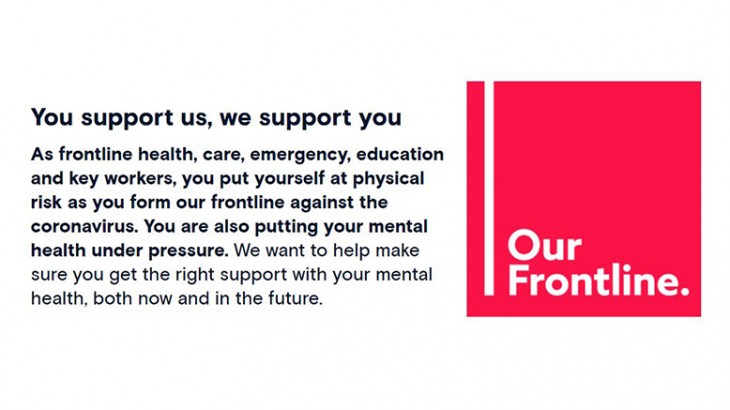Our Frontline

Leading mental health organisations have come together to provide a single service to support the millions of key workers who are putting their mental health under pressure in the fight against coronavirus.
‘Our Frontline’ is a collaborative partnership between Shout, Samaritans, Mind, Hospice UK and The Royal Foundation of the Duke and Duchess of Cambridge, providing a round-the-clock service for key workers like us, who need support with their mental health and emotional wellbeing.
Our Frontline offers practical, non-judgemental, one-to-one support, by call or text, from trained volunteers, with problems ranging from feeling overwhelmed or stressed through to coping with the bereavement of a colleague or family member, plus resources, tips and ideas to look after your mental health.
As part of the range of resources available to help colleagues with their mental health, Dr Shaun Davis, global director compliance & sustainability has written the below blog.
‘It has been a difficult year for all frontline workers across the UK, but I'm incredibly proud of the way our people at Royal Mail have stepped up to the challenge of working throughout the pandemic,’ said Shaun.
‘The difference that creating a work environment where colleagues feel comfortable talking about their mental wellbeing cannot be overlooked. It’s vital that people feel supported at work, not just through a pandemic, but every day, and we do a lot of work throughout the year on mental health.
‘We have internal support networks and initiatives in place to support every employee at Royal Mail. This meant that when Covid-19 arrived, we had the tools in place to support colleagues with their wellbeing.
‘It’s crucial that we can all talk openly about our mental wellbeing. It makes it real, that’s what people want, they want the reality of it. Personally, I practice what I preach. I make sure that I eat well, sleep well and get enough time for exercise. At points during the pandemic, I've been working from sunrise to sunset. So, it was important to make sure that I found time to take care of myself. Taking this time, no matter how busy you are at work, can make a massive difference to your mental and physical resilience.
‘If frontline colleagues are struggling with their mental health, my advice would be to turn to each other. We all have tough times, we all have challenges. It doesn’t have to define you. If you came into work with a broken arm, you’ll be in a cast for a few weeks, have a bit of physio and then it’s done. You’re not always going to be treated as “that’s the person who broke their arm,” it doesn’t stay with you for the rest of your life. We need to try and normalise mental health to make the thinking and perceptions around it the same. We need to ensure people know that there is support available and that their mental health doesn’t define who they are.
‘I fully understand that some people might feel worried about being labelled as “that person with a mental health condition,” but experiencing challenges to your mental health doesn’t mean you will always struggle. It could just be a particular moment in time that is affecting you, such as going through a break up or not getting on well with your boss. All of these issues are part of you, not all of you, and talking about the challenges you’re going through can make them feel more manageable.
‘If I had someone in my team talk to me about a mental health issue they’re experiencing, I wouldn’t see them as any less capable in their job. I would instead see them as a great ambassador for mental health because you could argue, who could empathise better with someone with a mental health challenge than someone going through a similar experience.’



